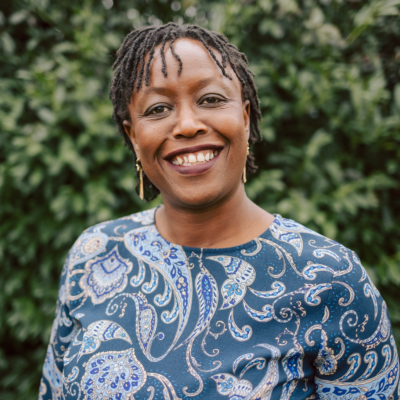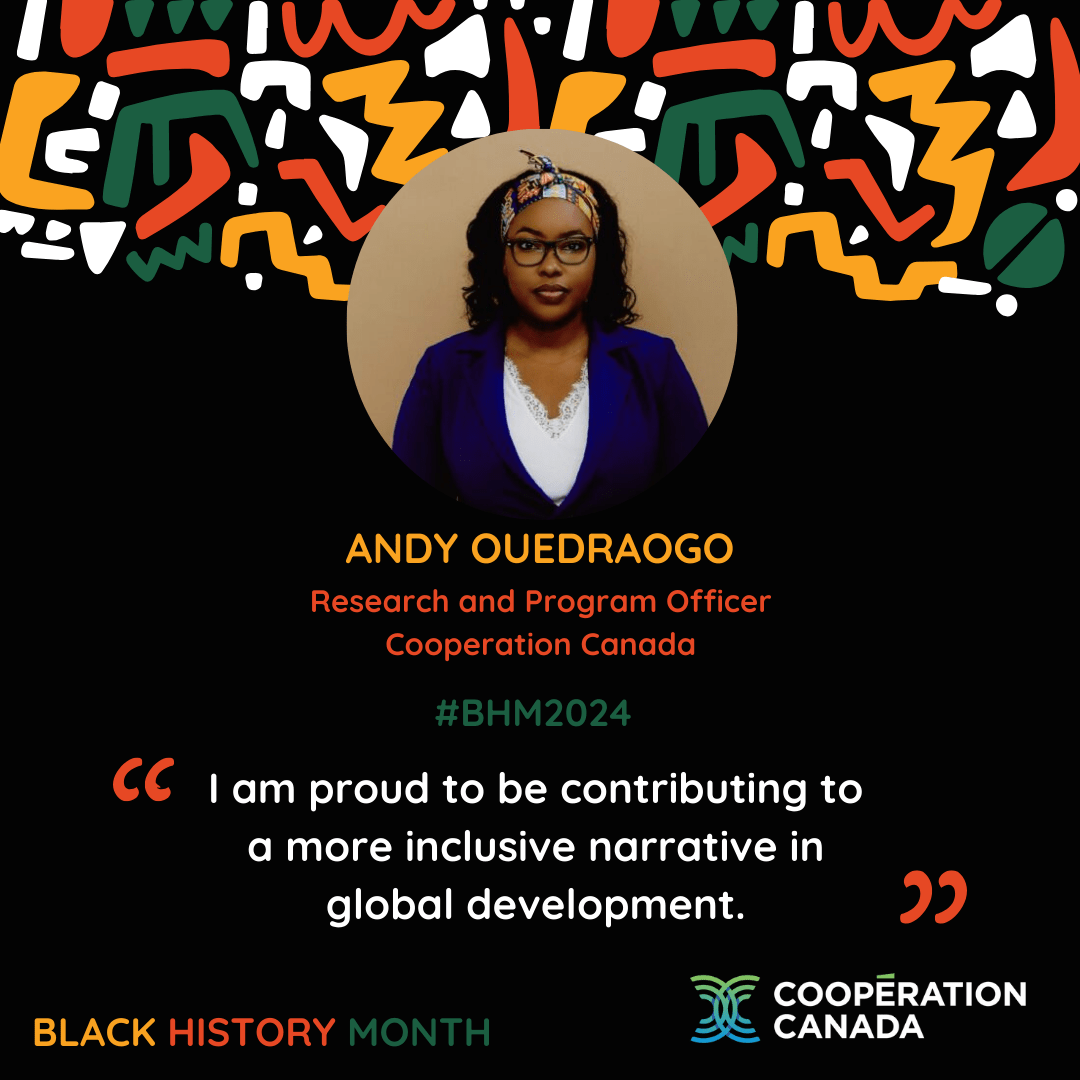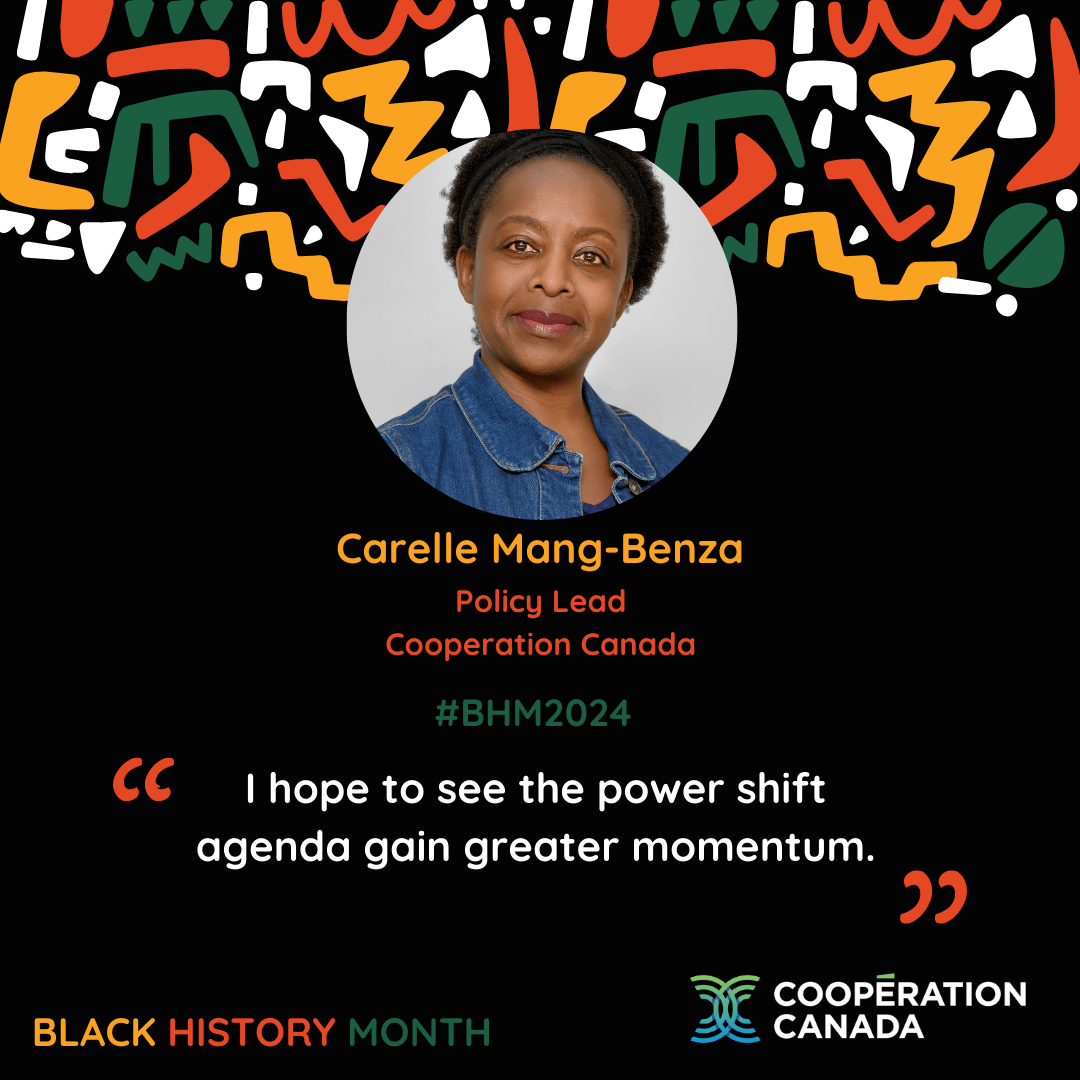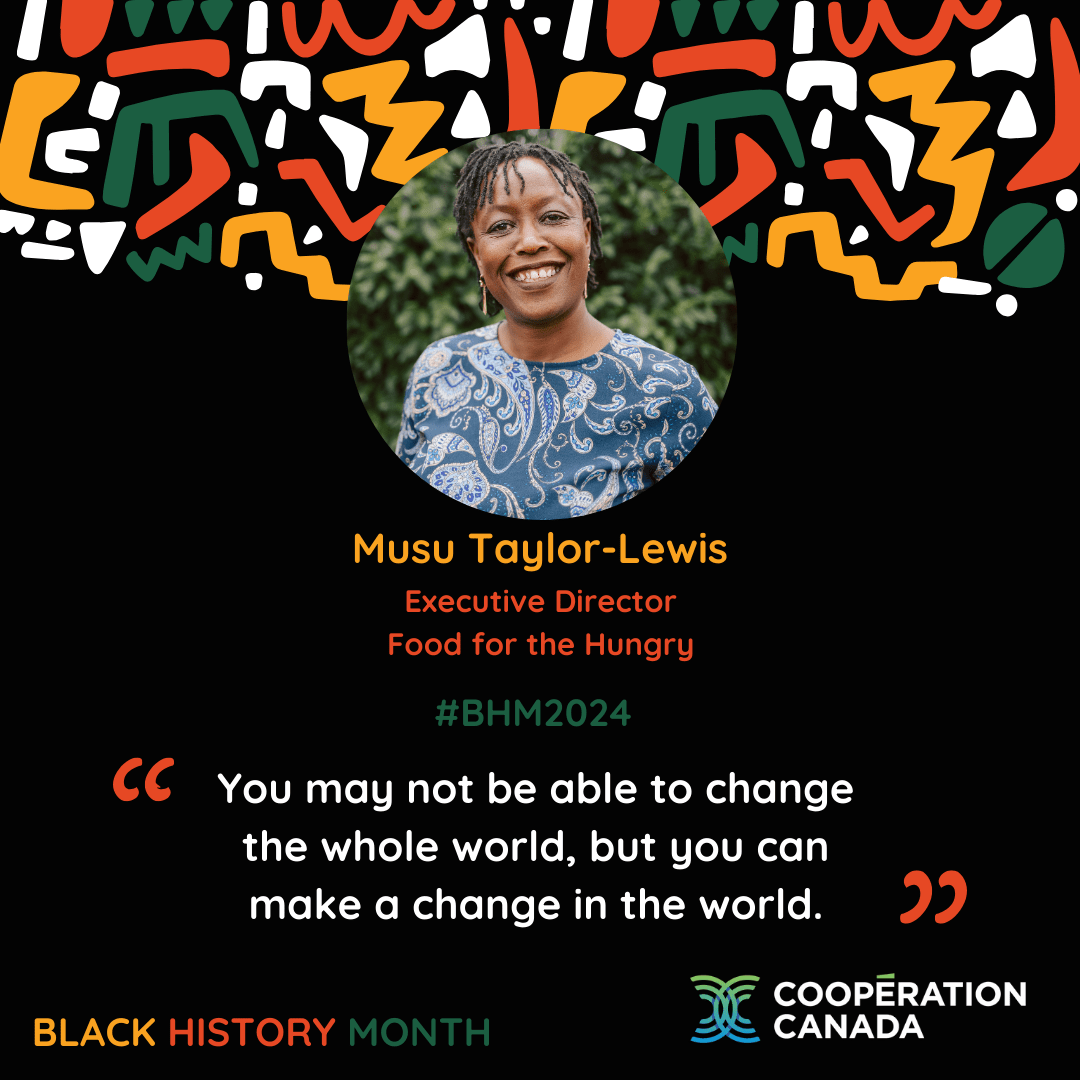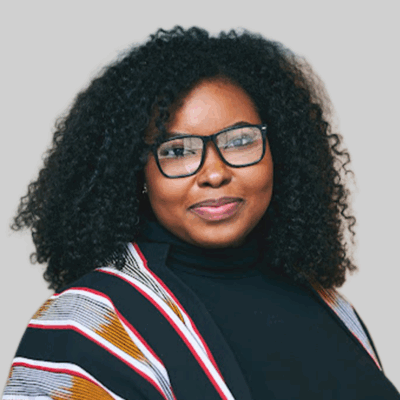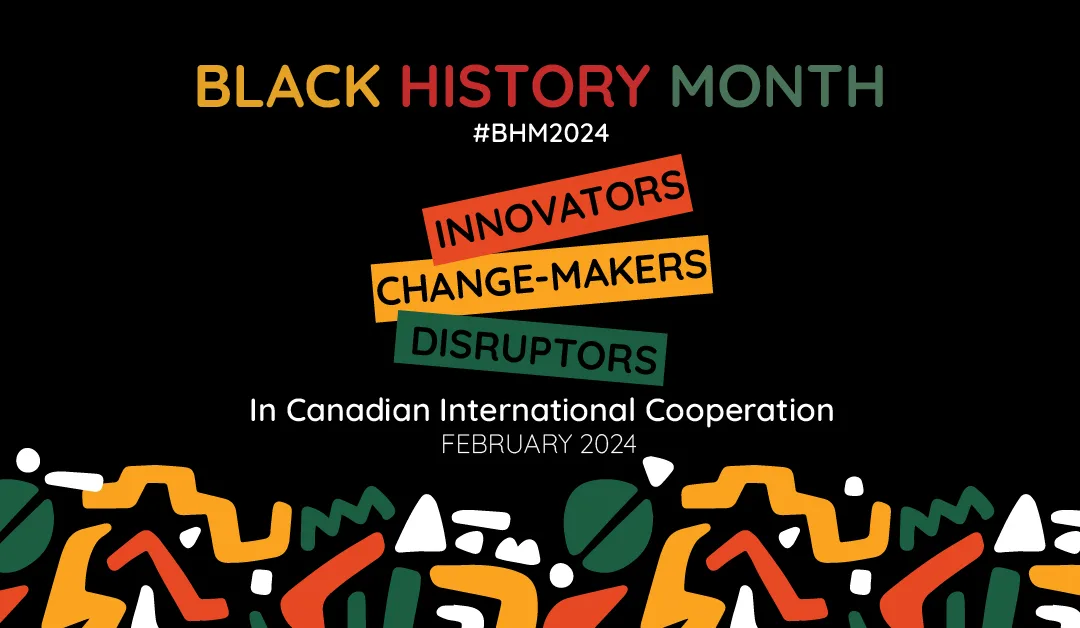
by Cooperation Canada | Feb 26, 2024 | Anti-racist cooperation, ARC Hub, News
Interview with Musu Taylor-Lewis, Executive Director of Food for the Hungry
1. Why did you decide to work in international cooperation and what have been some career highlights?
For a long as I can remember I’ve wanted to contribute to economic development. My family is from Sierra Leone and my parents instilled in us a sense of community responsibility. Growing up in different parts of the world made me super conscious of the unequal opportunities available to people depending on where they were born and I have never been comfortable with that reality.
Meeting people whose stories I had written or told in project reports is a highlight of my career. It is a profound reminder to hold our responsibility as mediators of those stories with humility and care. Serving as a member of the inaugural advisory committee for the development of an anti-racism action plan for the Canadian international cooperation sector and being able to contribute to the production of the framework for anti-racist change. I cannot describe how I felt when the first report was completed. It really represented its name as a collective commitment to change and my heart sang!
2. What experiences have influenced your career as a Black person in the international cooperation sector?
My Aunty Amina’s story. My father’s sister never had the opportunity to attend school and when I think of the disparity in her life and her brothers’ lives and the difference that continues to make for my siblings and our cousins, I remain aware that inequality affects generations. So it is very personal for me to see the disparity extend at national and international levels. It means whole communities are being held back to the detriment of us all. Humanity cannot live up to its full potential while so many are kept from making the contributions they are capable of, given the right opportunities.
3. What are your hopes for the future, and what advice would you give to those wishing to work in international cooperation?
I am an unapologetic idealist. I hope for a future where everyone has the opportunity to live up to their full potential. A future where health services, food and education are not luxuries for anyone in the world, no matter where they live or their level of wealth. For someone coming into the sector I would tell them that this is not work for superheroes, there is no magic formula for change, it is slow collaborative work to chip away at the structures that disadvantage different peoples. You may not be able to change the whole world, but you can make a change in the world, just find a corner and start chipping away, you’ll find others to lean on. Idealism has to be tempered with realism so that you don’t burn out or become disillusioned.

by Cooperation Canada | Feb 15, 2024 | Anti-racist cooperation, ARC Hub, News
Interview with Carelle Mang-Benza, Policy Lead at Cooperation Canada
1. Why did you decide to work in international cooperation and what have been some career highlights?
When I first worked with a bilateral donor many years ago, I was more interested in the subject matter (environmental policy) than the sector of international cooperation. I gradually grew to discover, appreciate, and critique the sector, as I moved from bilateral to multilateral cooperation.
Everything I consider as a professional highlight is tied to human experiences working in and with countries where programs are implemented: that conversation with a teenage girl victim of sexual abuse in a displacement camp; that 10-y old boy who voiced his grandmother observations about climate variations over her lifetime; that seasoned farmer who found the boldness to share his experience in land management in front of the agriculture experts; that UN colleague whose program funding shortage was solved by the local community and their diaspora relatives; and so many others…
2. What experiences have influenced your career as a Black person in the international cooperation sector?
The above experiences have shaped my professional opinions as a person. They probably resonated with me in this way because, as a Black woman, I can see racially motivated behaviors, hear prejudice-laden language, and feel when people assert their agency and power a certain way. I have to say that I have been equally influenced (and irritated) by self-destructive behaviour and self-victimizing language.
3. What are your hopes for the future, and what advice would you give to those wishing to work in international cooperation?
My hope is to see the power shift (often called localization) agenda gain greater momentum to transform international cooperation practices. Those wishing to work in this sector should be comfortable not with the present of the sector but rather with a future where power and authority will be more equally distributed.

by Cooperation Canada | Feb 8, 2024 | Anti-racist cooperation, ARC Hub, News
This Black History Month, Cooperation Canada would like to highlight the remarkable black changemakers, innovators and disruptors who are shaping Canada’s international cooperation sector.
Cooperation Canada will highlight members of its team and network to learn more about their stories and experiences.

by Cooperation Canada | Feb 8, 2024 | Anti-racist cooperation, ARC Hub, News
Interview with Andy Ouédraogo, Research and Program Officer at Cooperation Canada
1. Why did you decide to work in international cooperation and what have been some career highlights?
Growing up, my parents served as guiding beacons, inspiring a deep-rooted commitment to community service and compassionate leadership. This upbringing instilled in me a profound passion for humanitarianism and development. Yet, the pivotal moment that propelled my career into international cooperation occurred in 2016. During a journey back to Burkina Faso’s capital, my family and I encountered a distressing accident scene—a lack of emergency response left critically injured individuals waiting for an ambulance for two agonizing hours. Having lived in Canada for two years at the time, the stark contrast between Global North and South became glaringly apparent. This experience, coupled with the escalating humanitarian crisis in my homeland, compelled me to redirect my career from Business Management to International Development. Years later and it is still the moral cornerstone in my quest for a world that is not only safer but also marked by fairness and justice.
What have been some career highlights?
Receiving the Henderson Award for International Development in 2020 marked a pivotal career highlight, recognizing my role in the design of a grassroot initiative for humanitarian crisis relief. This project aimed at empowering internally displaced women through vocational training and apprenticeship programs, challenging conventional aid practices and promoting self-reliance through the participation of IDCs in the (formal and informal) economy.
Another defining moment in my career unfolded during the COVID-19 pandemic, when I had the privilege to work for the 76th President of the United Nations General Assembly. During this time of crisis, which starkly exposed racial and ethnic disparities, especially with Black women bearing a disproportionate burden, being part of a historic presidency of hope held particular significance for me as a young Black woman, navigating a professional landscape where representation remains a huge challenge.
Finally, as I reflect on my current role as the lead for the Global Cooperation Futures Initiative at Cooperation Canada, I am proud to be contributing to a more inclusive narrative in global development. This strategic foresight project not only fosters innovation but underscores the importance of diversity in navigating the complexities of international development and collectively carving new paths toward a future we all desire.
3. What experiences have influenced your career as a Black person in the international cooperation sector?
Throughout my career, my experiences as a Black professional have been shaped by both opportunities and challenges. While I’ve been fortunate to engage in initiatives fostering diversity and inclusion, entering predominantly white professional spaces has brought about unique pressures. In these environments, the weight of representing an entire community can be palpable, creating a burden that goes beyond professional responsibilities. There has been at times a fear of inadvertently reinforcing stereotypes and the added pressure of potentially impacting opportunities for others who share my background. Moreover, I’ve encountered instances where assumptions based on my origins influenced expectations about my opinions. Navigating these complexities highlights the ongoing need for genuine inclusivity, where individuals are valued for their unique perspectives rather than burdened by preconceptions tied to their racial or ethnic identity.
4. What are your hopes for the future, and what advice would you give to those wishing to work in international cooperation?
Aspiring for a future marked by increased inclusivity in the international cooperation sector, my hopes involve the dismantling of barriers to entry, beginning with the elimination of unpaid work, such as internships or fellowships. The prevalence of unpaid positions creates a disadvantage, particularly for Black professionals who may not have the financial means to engage in such opportunities, placing them at an inequitable starting point compared to their counterparts. In promoting Equity, Diversity, Inclusion, and Justice, we all have the responsibility to ensure that our initiatives proactively address these systemic barriers without being hindered by perceived funding constraints.
Lastly, for those aspiring to enter the field of international cooperation, my advice would be to anchor themselves in their purpose. While the journey is fulfilling, challenges may arise that provide reasons to reconsider. Holding onto one’s motivation becomes essential amidst the rewarding yet potentially demanding nature of this career path.
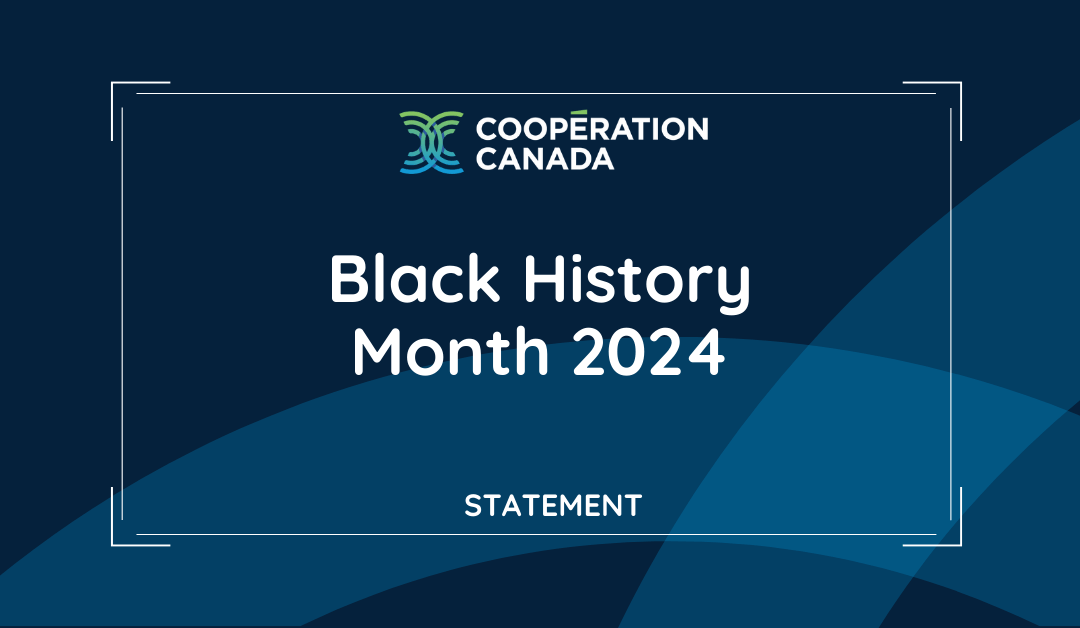
by Cooperation Canada | Feb 6, 2024 | Anti-racist cooperation, ARC Hub, News
As we celebrate Black History Month, we at Cooperation Canada renew our commitment to key principles at the heart of our work: inclusion, equity and decolonization. We recognize that building an equitable world begins with understanding, respect and solidarity. We are excited to launch initiatives throughout the month of February to honour the diverse contributions of the Black community to Canadian international cooperation while continuing efforts to dismantle systems of oppression.
With a membership of over 100 Canadian international development and humanitarian organizations, Cooperation Canada believes that as a sector we must take concrete steps to address the legacy of racial prejudice and colonialism in international cooperation. We encourage all those interested and involved in international cooperation to be inspired and guided by the Anti-Racism Framework for Canada’s International Cooperation Sector.
To mark Black History Month this year, we are launching a digital campaign to highlight the remarkable change-makers, innovators and disruptors shaping Canada’s international cooperation. The campaign will celebrate and recognize the impact of the Black community in our sector.
In 2024, Cooperation Canada will also release its Anti-Racism, Equity, Diversity, Inclusion and Justice Strategy and Action Plan. After nearly two years of commitment and engagement from the Cooperation Canada Board and team, along with some expert help, the new strategy aims to strengthen anti-racism in the implementation of internal organizational practices and the broad work of the organization.
Cooperation Canada will also continue discussions with its members to revise its Code of Ethics, bearing in mind that decolonization and anti-racism are practices that require personal and organizational commitment and effort.
While we will be allocating time for our team to reflect on the historical violence, systemic injustices and the resilience of African, Caribbean and Black communities, we recognize that these reflections and commitments must extend beyond Black History Month. We look forward to continuing our efforts towards decolonization, dismantling structures of oppression, championing equity and amplifying marginalized voices long after February.
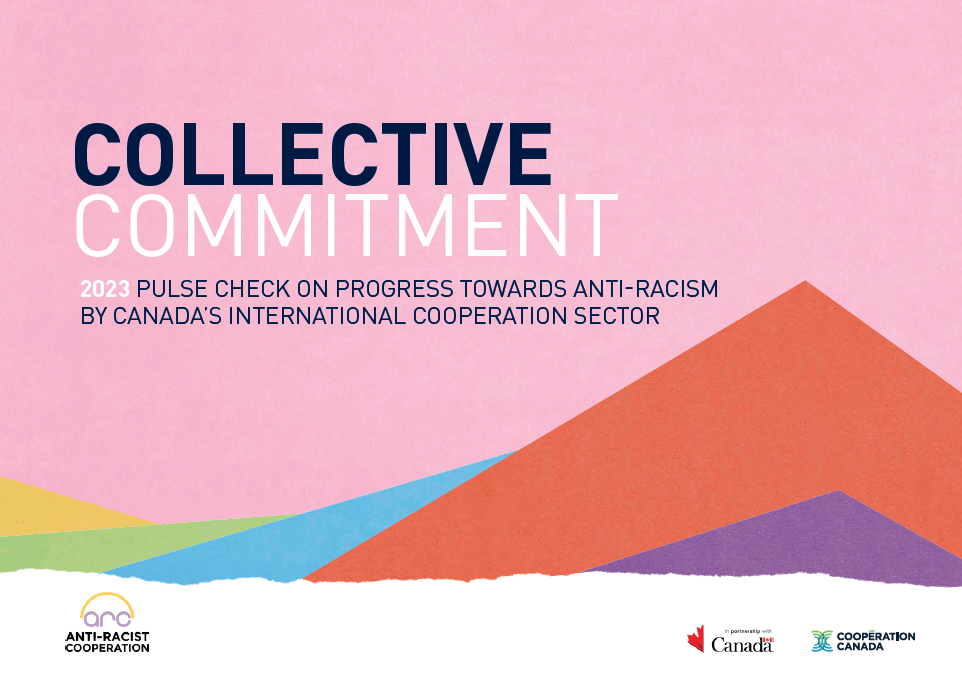
by Cooperation Canada | Dec 12, 2023 | Anti-racist cooperation, ARC Hub, News
Each year, the Collective Commitment Report represents a tangible commitment by organizations in Canada’s international cooperation sector to reflect on, identify and address systemic racism in the sector. The 2023 Collective Commitment Report serves as a check-in, tracking the progress made by signatory organizations in advancing ARC commitments and implementing recommendations for equitable transformation.
The findings of the Collective Commitment Report are based on answers from organizations in Canada’s international cooperation sector who responded to a survey on the state of anti-racism practices in their work. The report tracks progress and draws on evidence to identify gaps and opportunities for anti-racist change in the sector.


